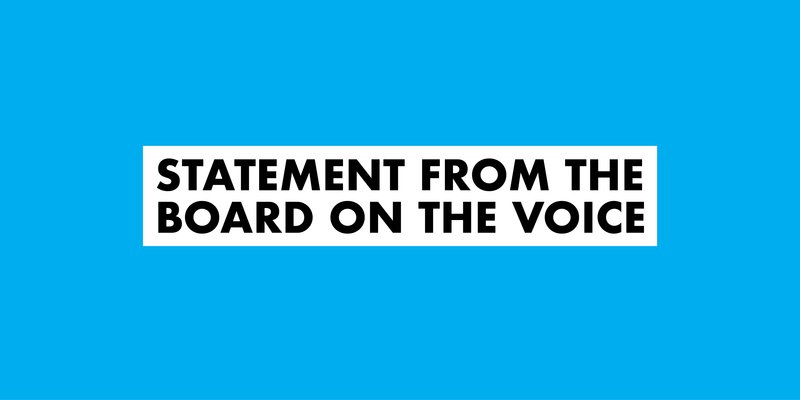On 14 October 2023, a national referendum will be put to a compulsory vote about whether to change the constitution to establish an Aboriginal and Torres Strait Islander Voice to Parliament.
In the lead up to the referendum, the NAVA Board encourages Members, subscribers and friends to approach your decision with respect, empathy, and a commitment to making an informed choice that reflects your values and concerns. We also encourage you to do your own research so that the burden of education and information is not, as always, laid at the feet of First Nations artists, friends, individuals and communities.
First Nations peoples have long called for increased autonomy, referred to as the concept of ‘self-determination’, but which can usually only be enacted within the framework of the Australian state. First Nations people simultaneously continue to call for complete sovereignty outside of the framework of the state and crown.
NAVA supports all First Nations peoples and communities in their right to self-determination. NAVA’s Code of Practice explains that self-determination includes the rights:
- not to be discriminated against
- to enjoy culture, lands and waters
- to be economically self-sufficient
- to be involved in decision-making processes that impact upon First Nations lives
- for a community to govern and manage its own affairs.
The concept of self-determination is an international concept. Article 3 of the UNDRIP states that Indigenous people have the right to self-determination. While the UNDRIP does not define ‘self-determination’, two key elements of the concept have been identified being ‘participation in decision-making and freedom from discrimination’. Australia has not yet implemented the UNDRIP into domestic law.
Next month, people will be asked to vote by writing 'Yes' or 'No' to the following question:
“A Proposed Law: to alter the Constitution to recognise the First Peoples of Australia by establishing an Aboriginal and Torres Strait Islander Voice. Do you approve this proposed alteration?”
For a referendum to be successful, a double majority must support it. For a referendum to pass, it has to achieve a majority of ‘yes’ votes nationally, and the majority of ‘yes’ votes in a majority of states. So, at least four of the six Australian states have to vote yes.
Researching and considering all relevant information before casting your vote is essential. To help you with this process, here are some general steps to take:
- Research the Referendum: Start by understanding what you're voting on and what the proposal entails. This includes understanding the purpose of the Aboriginal and Torres Strait Islander Voice, its structure, functions, and how it aims to enhance the representation of First Nations communities. Familiarise yourself with the historical context of Aboriginal and Torres Strait Islander efforts for recognition, reconciliation, and self-determination such as the Uluru Statement from the Heart, Barunga Statement, Larrakia petition, Yirrkala bark petitions, and the William Cooper petition.
- Gather Information: Look for reputable sources of information such as news articles, official websites, policy papers, and independent analyses. Be wary of biased or unreliable sources. While opinions matter, base your decision on credible information rather than emotional appeals or misinformation.
- Consider Multiple First Nations Perspectives: Listen to and read First Nations peoples’ and organisations’ opinions and perspectives. They can provide valuable insights into the potential benefits and challenges of the proposed Voice. This will help you develop a well-rounded understanding of the topic and make an informed decision.
- Evaluate Consequences: Consider the potential outcomes of your vote. How might your decision impact the lives and rights of Aboriginal and Torres Strait Islander peoples? Think about short-term and long-term consequences.
- Engage in Discussions: Discuss the issue with friends, family members, and colleagues, including First Nations people if they consent. Hearing different perspectives can help you gain new insights, deepen your understanding and refine your own thoughts. It’s okay to ask questions that can’t be answered by your own research.
- Attend Public Forums: Attend discussions, debates, town halls, and public forums where advocates for ballot measures present their arguments and answer questions.
- Check Your Voting Eligibility: Ensure you are registered to vote and aware of your area’s voting requirements and deadlines.
- Review Your Decision: Before finalising your decision, review the information you have gathered and consider if it aligns with your values and priorities. Avoid rushing your decision. Take the time you need to feel comfortable with your choice.
- Trust Your Judgment: Ultimately, the decision is yours. Trust yourself to make the best choice based on the information you have gathered.
The last referendum that Australia undertook was in 1999, and prior to that was in 1967. A referendum does not come around frequently, and will have lasting ramifications for the ongoing relationship between First Nations people and non-Indigenous Australians in this country, so it is critical that thought and time is put into how you will vote and why.







